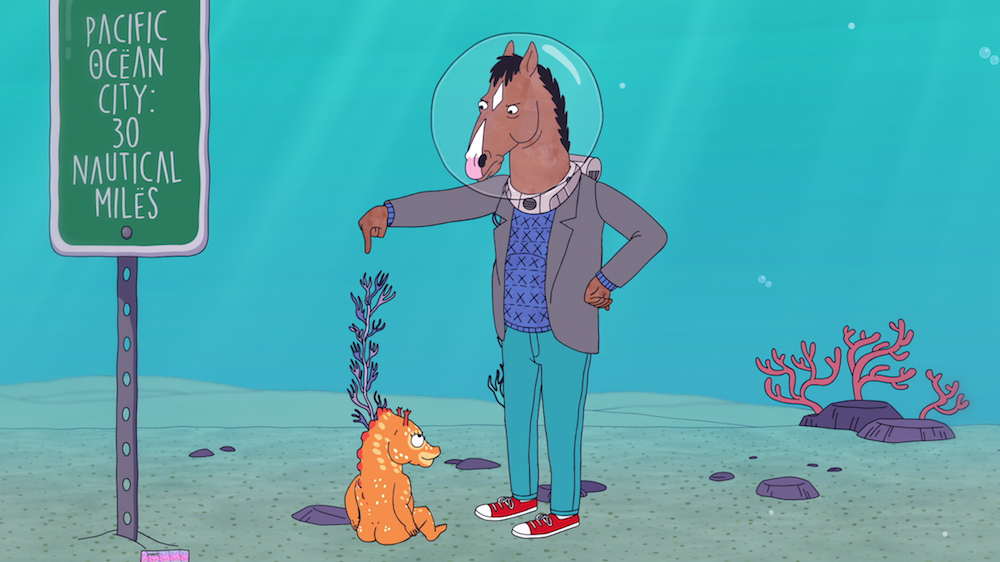The third season of Netflix’s acclaimed animated series BoJack Horseman was made available for streaming last week. This dark comedy series follows the adventures of a washed-up alcoholic actor (voiced by Will Arnett) in a world where talking animals coexist with humans—and while its premise may sound strange or off-putting, there’s a reason that the series has resonated with comedy fans: it manages to be both entertaining and hilarious in its examination of some very human issues.
When we last saw BoJack at the end of season two, he was struggling with depression and feelings of inferiority after landing the lead role in Secretariat, the biopic of his childhood hero. The first three episodes of season three are extremely entertaining, and it’s apparent from the outlandish plots and crackling dialogue that BoJack’s writers are in fine form. But the fourth episode, “Fish Out of Water,” is unquestionably the best episode of the season—and may be the best of the entire series thus far.
“Fish Out of Water” drops BoJack into a new environment when he travels to promote Secretariat at the Pacific Ocean Film Festival; fittingly, this Festival is held underwater, and land creatures who visit this unusual locale must wear oxygen helmets that resemble classic sci-fi astronaut helmets. BoJack’s initial confusion and dismay over the limitations that wearing the helmet entails (wearers cannot drink alcohol or smoke cigarettes, and it’s been established in previous episodes that BoJack is dependent on both of those things) sets the stage for the episode’s incredible second half, during which he accidentally becomes responsible for an adorable baby seahorse whose dad has accidentally abandoned it.
Interestingly, BoJack’s quest to return the lost seahorse baby to its dad is almost completely devoid of dialogue. Although this device shouldn’t work in a show that has been critically acclaimed in large part because of its excellent dialogue, the writers deserve a ton of credit here; the gags, visuals, and payoffs of jokes established earlier in the episode all work beautifully (there is a wonderfully strange commercial that features Mr. Peanutbutter and a gaggle of baby seahorses early in the episode, for which the payoff is both humorous and strangely charming) to add up to a cohesive whole. Other reviewers (Vulture’s Jesse David Fox and Jenny Jaffe) have pointed out this episode’s resemblance to the films of Charlie Chaplin and classic cartoons, but the absence of dialogue and use of inventive, unexpected visuals to tell the story reminded me of a season three episode of Cartoon Network’s wildly popular Adventure Time that used a similar storyline and lack of dialogue.
Like the Adventure Time episode, “Fish Out of Water” utilizes a storyline that could easily turn maudlin in the wrong hands, but the use of a seemingly standard plot device to reveal a different side of the protagonist pays off in unexpected ways. As this episode reveals—as does the season as a whole—even with the success of Secretariat, BoJack doesn’t quite know what he wants, and he struggles to make lasting connections with those around him.
Of course, this being BoJack Horseman, the jokes, visual puns, and cultural references are abundant throughout the third season, even if many of the aforementioned jokes and puns usually have a darker spin than those of the average television comedy. The continued mixing of lofty themes with sharp dialogue, background jokes that range from outright strange to exceedingly silly, and humorous character development is, in large part, what makes BoJack Horseman such a successful comedy series.


Great review, as a big fan of the show I enjoyed reading this.